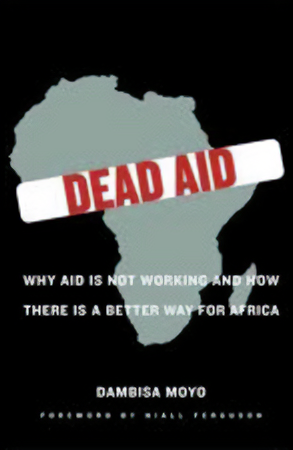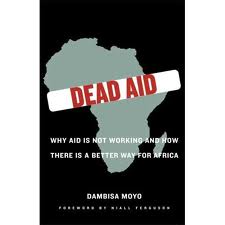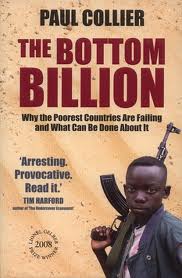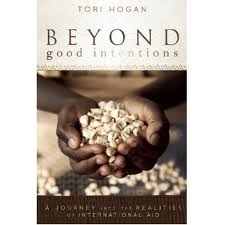Ok, for people with a really short attention span, my quick answer is “Not to Aid,” at least most of the time. That’s what I’ve come to after six months and three books on the subject. Granted this is fairly slim experience compared to the experts in the field but the experts don’t all agree and also you get what you pay for and reading this blog is free!
When thinking about international development aid, I think there are two separate but related questions. The first is whether the aid money actually works to promote development. The second is whether citizens of the recipient country really want us to help them develop or would prefer we all go home.
On the first question, it’s clearly not an unequivocal “yes” and some would argue that aid retards rather than promotes development. This is the argument in Dead Aid: Why Aid is Not Working and How There is a Better Way for Africa by Dambisa Moyo, a Zambian born economist who has worked at Goldman Sachs and consulted to the World Bank. Her thesis is that aid is almost always a bad thing and she spends most of the book suggesting alternative and healthier ways that poor countries can finance their own development. Given that she worked for Goldman, it’s difficult for me to see beyond the self serving ways of American financiers but she makes some good points about why aid actually hurts recipient countries and makes it less likely they will build the economic and governance systems that are needed for successful development.
The best book I’ve read that includes a discussion of aid is Paul Collier’s The Bottom Billion: Why the Poorest Countries are Failing and What Can Be Done About It. Collier’s book describes the four traps that the countries encompassing the billion poorest people in the world, almost all of them in Africa, have gotten caught in. He is not against aid in all cases and believes it has resulted in increased growth of about 1% a year among African aid recipients but he also points out how it can be detrimental when given incorrectly, as it frequently is. He suggests that changing trade policies might be at least as important to help poor countries but notes that it is, unfortunately, politically more difficult than just throwing money at the problem.
Finally, Beyond Good Intentions by Tori Hogan reviews her own experiences and observations of the ineffectiveness, poor management, and arrogance of many aid projects.
Both Collier and Moyo point out that aid money acts similar to money earned from natural resources (in Collier’s book “the resource trap”) such as oil, gold, or diamonds, including the promotion of corruption among government officials since it is so easy to steal. Aid or resource revenues also promote Dutch disease, the economic phenomenon of large influxes of money to a country inflating its currency thereby destroying its export market, taking along with it the industries that could have brought foreign currency in and employed domestic workers. Both aid and extraction income can be helpful to countries that already have good governance systems (like Norway which already had the governance before the big resource revenues rolled in) as the money is then used effectively. Unfortunately, good governance is hard to come by in the bottom billion countries and this is why so many resource-rich and heavily aided countries are in such bad shape as the money just gets stolen or wasted and meanwhile hurts both the economy and governance. These arguments convinced me that aid to governments is usually a bad thing. But what about smaller aid projects like the school I’m working with in which the money goes directly to a project instead of to a government?
This brings me to my experience living here in Tanzania. It’s been hard not to notice that most efforts at improving anything are foreign initiated and funded, either by missionaries, large NGO’s, or smaller projects like Sega, the school where I’m working. How does the local culture and the desires of the people play into whether aid makes sense? Tanzanians seem fairly happy, healthy, and relatively satisfied, despite the statistics of this being such a poor country. I haven’t witnessed much hand wringing or overt efforts to improve conditions and the stock answer when something isn’t running well is that it’s due to “corruption,” which may be true. So if there’s no big push here, either to fix the corruption or to make various other things better, why are those of us from outside the country so keen to come in to offer or impose our fixes and our values?
Certainly, some folks find it hard to watch or hear about suffering and not do something about it (this includes Polly, the founder of Sega) and of course there is suffering here: the poorest, the women and girls, the disabled, the orphans, etc. While I applaud this instinct, I wonder about the creation of the aid or handout mentality, a culture of taking. Tanzanians never hesitate to ask for money, to charge white people more, to expect employers and coworkers to take care of their every need, and to mooch off friends and family for all manner of things.
The values here and in the US are truly different with Americans emphasizing individual responsibility and hard work, with resulting negatives in our culture including isolation, workaholism, and greed. Tanzanians focus on family, enjoying the present and, if a need arises, they assume someone else will help them. While this is appealing and one of the reasons they are widely seen as lovely, friendly people, there is little planning for the future, personal savings, or pride of work, all important ingredients for improving livelihoods. Looking at the culture, it’s difficult to see things improving that much anytime soon.
Collier argues that we should be promoting development, not mainly through aid, in poor countries for our own good because a billion very poor people in an increasingly rich world (Asia and most other places outside of Africa are rapidly developing), will provide an unhealthy cauldron for extremism and terrorism that will then have negatives for all of us. He may be right. And then there’s the likelihood that rich countries give aid strategically, in order to get resources or keep countries from allying with their enemies, rather than to promote development, so we shouldn’t be surprised that aid money often doesn’t help those countries’ citizens since that’s not its purpose.
But I think that most Americans, at least all the soft hearted folks I know, really do want to do some good for the poor of the world so would not be happy to realize that our strategic interests are being dressed up as doing good but are frequently doing the opposite. There are projects, however, that I am confident are actually moving things in the right direction and I’m happy and relieved that I’m working with one of them.




Thanks for such a thoughtful and thought provoking writing. I am glad that you are working for an organization that is moving things in a helpful direction. I hope that you are well and enjoying your time in Tanzania.
Very well said! Here’s my take-away: It doesn’t have to be an “all or nothing” proposition. That the best, most effective projects may very well be the small, local ones such as Sega.
Very informative and thought-provoking post; thanks April!
Here’s another interesting book on the topic of overseas aid: “Toxic Charity” by Robert Lupton